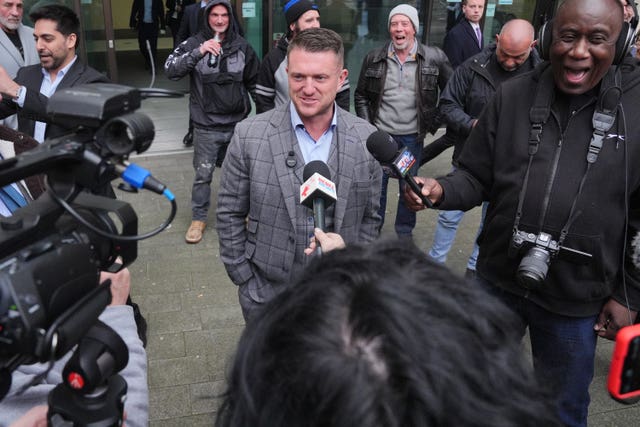
Tommy Robinson has been cleared of breaching a dispersal order after a judge ruled the power had not been legally authorised by police.
The controversial activist, 41, whose real name is Stephen Yaxley Lennon, was arrested at a march against antisemitism near the Royal Courts of Justice in London, where the demonstration began, after organisers said he would not be welcome at the event.
On Monday, the senior Metropolitan Police officer who signed the dispersal order admitted it may not have been lawful after he used the wrong date on the paperwork.
Inspector Steve Parker-Phipps, responsible for policing certain aspects of the protest, imposed a Section 35 order under the Crime and Policing Act 2014 when he thought a “right-wing group” could potentially be attending, the trial at Westminster Magistrates’ Court heard.
Inspector Parker-Phipps, whose laptop battery was “dying”, put the order in place at 10am on November 26, but accidentally dated the form for November 24.
Mr Robinson’s defence lawyer Alisdair Williamson KC told the court there had been a “litany of catastrophic errors” in the Met’s handling of the incident.
Questioning the inspector, Mr Williamson said: “This document is not correct is it?
“Can we have any confidence that there was a lawful order in place?”
The officer replied: “No.”
Giving his ruling, District Judge Daniel Sternberg said: “I am not satisfied there was a legal authorisation.
“There is no case for you to answer.”

The trial was attended by numerous supporters of Mr Robinson who filled the public gallery.
During his arrest, officers sprayed Mr Robinson with synthetic pepper spray and handcuffed him.
He uploaded a video of himself with partially closed eyes to social media after the incident.
Other footage of him arguing with police officers was also posted on his X account, with Mr Robinson claiming to be present as a journalist at the march.


Why are you making commenting on The National only available to subscribers?
We know there are thousands of National readers who want to debate, argue and go back and forth in the comments section of our stories. We’ve got the most informed readers in Scotland, asking each other the big questions about the future of our country.
Unfortunately, though, these important debates are being spoiled by a vocal minority of trolls who aren’t really interested in the issues, try to derail the conversations, register under fake names, and post vile abuse.
So that’s why we’ve decided to make the ability to comment only available to our paying subscribers. That way, all the trolls who post abuse on our website will have to pay if they want to join the debate – and risk a permanent ban from the account that they subscribe with.
The conversation will go back to what it should be about – people who care passionately about the issues, but disagree constructively on what we should do about them. Let’s get that debate started!
Callum Baird, Editor of The National
Comments: Our rules
We want our comments to be a lively and valuable part of our community - a place where readers can debate and engage with the most important local issues. The ability to comment on our stories is a privilege, not a right, however, and that privilege may be withdrawn if it is abused or misused.
Please report any comments that break our rules.
Read the rules hereComments are closed on this article